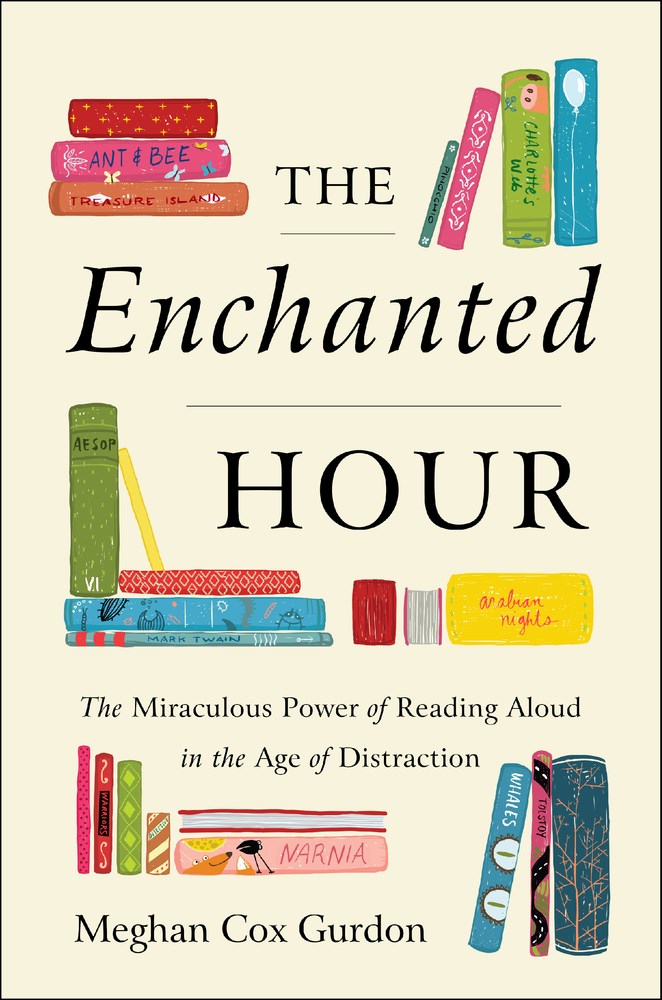The Enchanted Hour: The Miraculous Power of Reading Aloud in the Age of Distraction
April 24, 2019
Our newest employee, Emily Porter, reviews Meghan Cox Gurdon's new book about "The Miraculous Power of Reading Aloud in the Age of Distraction."

When you were in your youth, do you remember someone reading a story to you and being so captivated by their voice that it made the story that much more real? I do.
Reading has always been my happy place, my home away from home. Sharing it with a loved one made it that much more special. You were bonding through this secret world that you shared together. I remember having teachers and my parents reading Where the Wild Things Are, Anansi the Spider, Beatrix Potter, and Berenstain Bears. They were riveting as a child and I was so excited to sit and imagine the stories read aloud to me.
As I get older, I find myself purposefully scheduling reading time to stay sane in this tech crazed world we now live in. Sometimes I will even read aloud to my cats Ichabod and Willow who (in my head) seem to enjoy it as well.
In this modern day and age the average individual finds it almost tedious to sit back, relax, and enjoy the simple things in life (like reading a book) without the constant notifications from our now digital world. The Enchanted Hour: The Miraculous Power of Reading Aloud in the Age of Distraction by Meghan Cox Gurdon is an ode to the love of reading aloud, as well as a history of the written word and storytelling. She describes to the reader how reading picture books to children is a powerful learning tool, as well as how important it can be to the elderly or sickly to have a story told to them.
I was fascinated by how the book tells us about the different types of storytellers from around the world:
In ancient Greece, the voices belonged to rhapsodes; in ancient India, to charioteer bards called sutas. Elsewhere were skalds (Nordic history poets) and rakugoka (Japanese storytellers), along with the jongleurs, minstrels, and troubadours of medieval Europe. Shamans passed on the stories of tribal people native to North America. In West Africa there was, and is, an itinerant class of griots, the traveling tale-tellers and musicians who have been called living archives.
Gurdon brings to life how reading to children can deeply impact their development—specifically language. If you have little ones, are interested in science and how the world is changing rapidly, or just realize how dependent you are on your own screens, Gurdon’s book will provide you with a deeper insight into how reading is incredibly important. In my opinion vital!
The Enchanted Hour is for anyone who loves books, stories, art, and language.
Remembering to find time to focus on the ones you love or to have your mind focus on one story, article, or novel is hard when notifications of new photos and likes bombard the screens we have become dependent on. But Gurdon breaks through the noise.
I am always drawn to the cover and title of a book, and The Enchanted Hour is wonderfully illustrated and incredibly alluring. Before opening the book I presumed that Gurdon would touch on history, childhood development, and how it affects society in the modern day. The complete science nerd in me loves the way Gurdon uses statistics and science based studies to support her written material. The first half primarily focuses on childhood development and how reading aloud assists young minds into adulthood. This was interesting, but it felt like her message was more directed towards parents or teachers because of the density of stories that dealt with her own children, and the book is largely based around relating to having little ones. That being said, Gurdon also touches on the benefits of reading to the elderly, and the history and statistics of reading aloud. I was drawn to the second half of the book when it really touches on how reading helps build the mind, and the history of reading and storytelling. Perhaps when I am a parent, when trying to create time to read books I fell in love with aloud to my children, I will read the first half of the book differently.
There are also some beautiful moments of Gurdon's pure love of literature:
In literature, we are freed from physical constraints and from the orthodoxies of our time and place. We meet characters we would never encounter in the real world. In a vicarious way we experience life through them, and one result is an expansion of emotional understanding.
As of late, I have been determined to set aside time to put down my screens and sink into a book, focusing my mind on that one world. This book shows us the importance of doing so, and the power of reading those words aloud, within this ever growing modern world of technology. As a Wall Street Journal columnist specializing in children’s book reviews and a mother, Gurdon has quite an array of experience in the subject of reading aloud and reading with children. She lays before us a history of oral storytelling and how it has progressed through time, and how reading aloud to children can dramatically change the course and pace of their learning. Additionally, reading throughout life can keep us focused, and has been proven to heighten parts of the brain that moving imagery does not. Gurdon ends the book in an almost how-to way, answering questions that may pop up for a parent wanting to begin having an enchanted hour of reading time within the family.
The magic that I experience while reading a book, diving into another world or even another mind, was caringly captured by Gurdon. As a die hard reader, this book has filled me with information that I swallowed up and will undoubtedly come back to.

